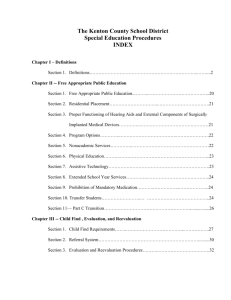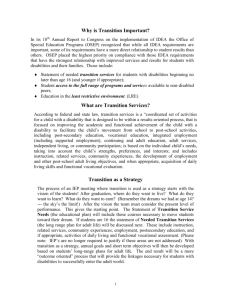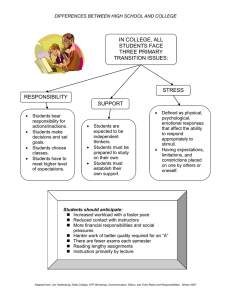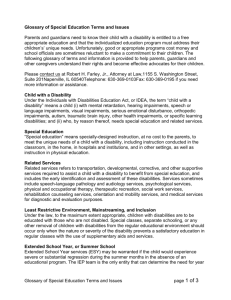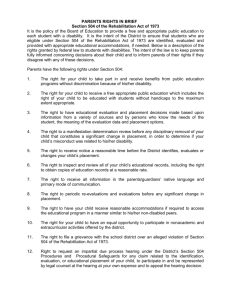Chapter 8
advertisement
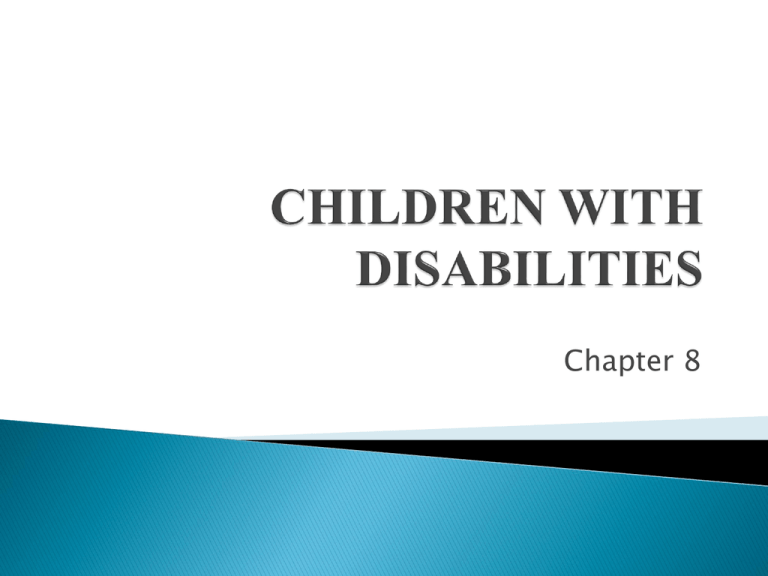
Chapter 8 Not knowing or ignoring special education law is one of the easiest ways for campus and district leaders to get into legal hot water. To look at it another way, however, is that by knowing special education law you are better able to serve those students in the most effective manner that has been determined for them. IDEA 1997 was designed to encourage mediation, state complaint procedures, and due process hearings to avoid litigation. An analysis of published hearings and court decisions from 1989 to 200 found that parents won, or partially won approximately 50% of these cases. The development of a cooperative school culture characterized by collaborative efforts to solve problems is an important leadership skill. Discourse ethics is a communication model designed to produce rational and coherent argumentation that can lead to a clarification of common interest and an acceptable and valid agreement among the parties involved. What is the difference between mediation and arbitration? Mediation is the process by which participants seek to understand the perspectives of others. It is important because it is by nature designed to facilitate the introduction of empathy into the process of reaching a decision. Understanding the perspectives of others requires an unconditional acceptance of the views, wants, and needs of others. This does not necessarily mean agreement, but rather forms the basis for an acceptable outcome. Arbitration is the process of selecting from alternatives to reach an acceptable decision. It can be viewed in the same way as negotiating a compromise where participants strive for an agreement on an acceptable outcome. Both mediation and arbitration are part of a process that provides for communication toward reaching an acceptable outcome. Parental involvement in special education is mandated by law. It is important that school leaders must develop the type of school culture that encourages understanding, cooperativeness, and consensual agreements. Special education disputes usually occur because of a failure to positively engage parents in the education of their child. Parents have an emotional investment in their children. Failure to at least seek to understand and acknowledge the needs and wants of parents is the primary reason for disputes in the first place. Training school personnel in communication processes could go a long way toward preventing disputes. IDEA was first enacted in 1975 The goal of special education legislation over the past 30 years has been to ensure that all children with disabilities have available to them a FAPE that emphasizes special education services designed to meet their unique needs and prepare them for future education. LRE represents the least restrictive environment. IDEA identifies the following disabilities:: mental retardation hearing impairments speech/language impairments visual impairments emotional disturbances orthopedic impairments autism traumatic brain injury other health impairments specific learning disabilities Six major principles to achieve the goals of a FAPE 1. Zero reject/child find 2. Nondiscriminatory evaluation 3. Appropriate education(IEP)/(BIP) 4. Least restrictive environment 5. Procedural due process 6. Parent and student participation Zero Reject is a rule against exclusion of special education students regardless of the nature or degree of their disabilities. Child Find requires state educational agencies(SEAs) and local educational agencies(LEAs) to initiate procedures to locate qualified children who are not being served. Nondiscriminatory evaluation is a fair evaluation to determine whether or not a student has a disability, and, if so, the appropriate placement and services required that meet the needs of the student. Appropriate Education (Individualized Education Plan) team consists of: 1. Parents 2. At least one general education teacher 3. At least one special education teacher 4. An LEA representative qualified to provide or supervise special education services and who is knowledgeable about the general curriculum and the availability of resources. 5. An individual who can interpret the instructional implications of the evaluation results 6. The child, when appropriate 7. Other individuals as requested by the district or parents. FAPE is defined in two ways: 1. Has the LEA complied with the procedures and requirements of the act? 2. Is the IEP reasonably calculated to enable the child to receive educational benefits? Related and Supplemental Services include transportation and other supportive services such as speech-language pathology and audiology services, counseling services, and medical services required for a child with a disability to benefit from special education. Medication: State and local educational agencies may not require a child to obtain and presumably take a prescription medication as a condition of attending school, receiving an evaluation, or receiving special education services. State Tests and Graduation: The U.S. Supreme Court has not ruled on a high-stakes requirement. However, lower courts have been relatively consistent of state efforts to require that students with a disability pass such tests as part of graduation requirements under certain conditions. LRE: The Supreme Court has not interpreted the LRE provision and a consensus definition or test for determining LRE has not emerged from the Circuit Courts, however it is clear that IDEA language assumes inclusion to the greatest extent practical. A school district may not be required to provide services at private schools if the student has been provided equitable services. LEAs are required to pay for private schools if disabled students are placed or referred as a means of carrying out the IEP. Procedural Safeguards: Procedural due process provides the safeguards necessary to ensure a cooperative process in which children with disabilities benefit from school. A significant part of this process is notice. Once per year, parents must receive written notice of procedural safeguards. Mediation: When necessary, the state pays for a third party to assist the parents and school district in reaching a mutually acceptable agreement. Hearing Officer: Due process is a formal adversarial process in which an impartial hearing officer listens to evidence presented by both sides. Due process is different from mediation in that there is usually a winner and a loser, and blame is often attached to the losing party. Student Discipline: FBA – functional behavior assessment PBS – positive behavioral supports 1. School personnel may consider any unique or special circumstances on a case-by-case basis in making change in placement. 2. School personnel may remove a child from their current placement to an alternative placement or suspension for up to 10 days. 3. 4. Relevant disciplinary codes applicable to children without disabilities may be applied to a child with a disability if it is determined that the behavior is not a manifestation of the child’s disability. Services must continue for children removed from their current placement ( suspended, expelled, assigned to an alternative educational placement ) for more than 10 days. This provision is applied regardless of the outcome of the manifestation determination proceedings. 5. 6. Children removed from their current placement for more than 10 school days must receive, as appropriate, a functional behavioral assessment, and behavioral intervention services and modifications designed to address the behavior violation so that it does not recur. Can remove a disabled student who brings a gun to school to apply to all dangerous weapons, the knowing possession of illegal drugs and/or the sale/solicitation of the sale of controlled substances, and/or has inflicted serious bodily injury upon another person while at school regardless of the outcome of the manifestation determination proceedings. 7. Has the ability to request a hearing officer to remove a child for up to 45 days if keeping the child in the current placement is substantially likely to result in injury to the child or others. Manifiest Determination is required when a disciplinary action results in a change in placement. The manifest determination is a review and assessment by the IEP team of the relationship between the behavior and the child’s disability. This relationship is determined by two questions: 1. Is the behavior in question caused by, or does it have a direct and substantial relationship to, the child’s disability? 2. Is the conduct in question a direct result of a failure to implement the IEP? If the answer to either question is yes, the conduct is a manifestation of the child’s disability. Functional Behavioral Assessments are “collected information about the student, describes problem behaviors, identifies possible causes and effects, and develops ideas for teaching alternatives”. Behavioral Intervention Plan is defined as “a set of strategies, interventions, and supports the school will provide for the student”. Hearing Office Authority: A parent of a child with a disability who disagrees with any decision regarding placement, or manifest determination, or an LEA that believes that maintaining the current placement of the child is substantially likely to result in injury to the child or others, may request a hearing. The hearing officer will hear and make a determination regarding the appeal. Children Not Identified: Disciplinary requirements of IDEA may also apply to students not yet identified. Referral to Law Enforcement: School officials are authorized to report crimes committed by a child with disabilities to appropriate authorities. Copies of the special education and disciplinary records of the child must be shared with the law enforcement agency. Parent and Student Participation: Parent and student participation in the process from start to finish is part of the safeguards outlined in IDEA. Section 504 of the Rehabilitation Act of 1973: Section 504 is a federal civil rights law that prohibits discrimination against individuals with disabilities in programs and activities that receive federal funds, including public K – 12 schools and universities. The Office of Civil Rights enforces Section 504.
